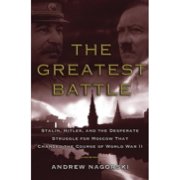A while back, I mentioned a book I’d like to read: “The Greatest Battle,” by Andrew Nagorski. It’s an account of the battle for Moscow in World War II. Although several of the blurbs on the back cover describe the book as gripping, I’d say it’s deliberate and workmanlike, almost plodding. But Nagorski does a thorough job relating the story of the German invasion, the Soviet defense, and Hitler’s and Stalin’s roles in the disasters that befell both armies and the calamity that was visited on the Soviet Union first through Stalin’s policies of purge and terror and second through Hitler’s determination to destroy the nation and its political system. I’d say go find it used or borrow it from your library if you like military epics.
Nagorski does talk a lot about the scale of the killing in the German-Soviet fighting. Of course, the entire war involved killing on a fearsome scale. You can read through the numbers, but I don’t think there’s any way to comprehend them. I always find myself thinking about the events that led to the catastrophe, and my thoughts always settle on Hitler and how he was able to move an entire nation to start in on such an enterprise.
Earlier today, Kate was reading a book of short pieces E.B. White wrote for The New Yorker. She read several of them, all from the 1930s, aloud. Here’s one — The New Yorker holds the copyright — published two months or so after Hitler came to power in 1933. It was titled “Inimical Forces”:
“Einstein is loved because he is gentle, respected because he is wise. Relativity being not for most of us, we elevate its author to a position somewhere between Edison, who gave us a tangible gleam, and God, who gave us the difficult dark and the hope of penetrating it. Not long ago Einstein was here and made a speech, not about relativity but about nationalism. ‘Behind it,’ he said, ‘are the forces inimical to life.’ Since he made that speech we have been reading more about those forces: Bruno Walter forbidden by the Leipzig police to conduct a symphony; shops of the Jews posted with labels showing a yellow spot on a black field. Thus in a single day’s developments in Germany we go back a thousand years into the dark, while a great thinker, speaking not as a Jew but as a philosopher, warns us: these are the forces inimical to life.”
[The book: “Writings from The New Yorker, 1927-1976.” At Amazon and many other fine retailers.]

